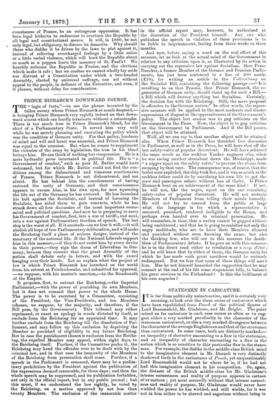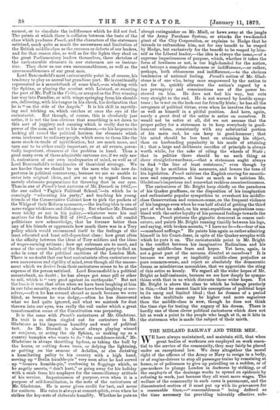STATESMEN IN CARICATURE.
IT is far from politically uninstructive, and it is certainly very amusing, to look over the three series of caricatures which have been republished from Punch of the political figures of Lord Beaconsfield, Mr. Gladstone, and Mr. Bright. The point seized on for caricature in each case recurs so often as to sug- gest either a very marked peculiarity in the character of the statesman caricatured, or else a very marked divergence between the character of the average Englishman and that of the statesman thus caricatured. In some cases, both are distinctly marked,— an inequality of character amounting to a flaw in the statesman, and an inequality of character amounting to a flaw in the nation which is so sensitive to this particular flaw in the states- man. For example, the dislike in the middle-class British mind to the imaginative element in Mr. Disraeli is very distinctly shadowed forth in the caricatures of Punch, yet unquestionably Lord Beaconsfield would not be where he is, if he had not had this imaginative element in his composition. So, again, the distaste of the British middle-class for Mr. Gladstone's intense earnestness and reality of purpose appears in cartoon after cartoon ; yet most assuredly without that intense earnest- ness and reality of purpose, Mr. Gladstone would never have wielded the power he has wielded, and still wields, for it was not in him either to be shrewd and sagacious without being in earnest, or to simulate the indifference which he did not feel. The points at which there is collision between the taste of the class which produces Punch, and the characters of the statesmen satirized, mark quite as much the narrowness and limitation of the British middle-class as the excesses or defects of our leaders, and for that reason also, as well as for the lights they shed on the great Parliamentary leaders themselves, these sketches of the caricaturable elements in our statesmen are so instruc- tive. They show us our own unreasonableness, as well as the unreasonablenesses of our great men.
Lord Beaconsfield's most caricaturable point is, of course, his tendency to play an unreal but grandiose part. He is continually represented as a mountebank of some kind,—as winking with the Sphinx, or playing the acrobat with Leotard, or enacting the part of Mr. Puff in the Critic, or arrayed as the Peri winning her way into Paradise, or with wings springing from his should- ers, delivering, with his tongue in his cheek, his declaration that he is " on the side of the Angels." It is his skill in mystify- ing and tricking us, which catches at once the eye of the caricaturist. But though, of course, this is absolutely just satire, it is not the less obvious that something is set down to this sort of jugglery and cunning which is really due to the power of the man, and not to his weakness,—to his largeness in looking all round the political horizon for elements which seem irrelevant to ordinary people, which seem to them like the mere stock-in-trade of mystification, but are much more, and turn out to be either really important, or at all events, poten- tially important, elements of the problem in hand. Thus a good many even of these admirable cartoons are, if we only saw it, caricatures of our own inadequacies of mind, as well as of Lord Beaconsfield's redundancies of theatrical strategy. We are harder than we should be on the men who take new de- partures in political controversy, because we are so unable to enter into original ideas, and are so apt to regard them as merely elaborate preparations for throwing dust in our eyes. Thus in one of Punch's best cartoons of Mr. Disraeli in 1867,— the one called "Fagin's Political School,"—in which he is cunningly " educating his party," and teaching his young friends of the Conservative Cabinet how to pick the pockets of the Whigs of their Reform measures,—the leading idea is one of mere vulgar trickiness and dishonesty. But whether Mr. Disraeli were tricky or not in his policy,—whatever were his real motives for the Reform Bill of 1867,—thus much all candid politicians now acknowledge, that he foresaw better than any of his friends or opponents how much there was in a Tory policy which would recommend itself to the feelings of the least educated and least self-dependent class ; how great often is the affinity between the ideas of Tory soldiers and the ideas of wages-earning artisans ; how apt extremes are to meet, and some of the secret beliefs of the Squirearchical party to find an echo in some of the political emotions of the London Mob. There is no doubt that our best caricaturists often caricature our own narrowness and rigidity of mind, even though all the amuse- ment which we derive from their caricatures seems to be at the expense of the person satirised. Lord Beaconsfield is a political mountebank, no doubt ; he has always got some pill or other to sell, which is " very good against an earthquake." But not the less is it true that often when we have been laughing at him in our false security, we should rather have been laughing at our- selves,—often he has seemed absurd as much because we were blind, as because he was dodgy,—often he has discovered what we had quite ignored, and what we mistook for dust thrown into our eyes, was really the veil under which a great transformation scene of the Constitution was preparing.
It is the same with Punch's caricatures of Mr. Gladstone. No trait is so often singled out for caricature in Mr. Gladstone as his imperious humility and want of political tact. As Mr. Disraeli is almost always playing wizard or conjuror, or acting the sly Sphinx, or making up as a country bumpkin who wants to do " the confidence-trick," Mr. Gladstone is always throttling hydras, or taking the bull by the horns, or cutting down trees, or defying the lightning, or putting on the armour of Achilles, or else dictating a humiliating policy to his country with a high hand, serving up "Berlin humble-pie" very soon after he had served up "Geneva humble-pie," confessing to floggings which, as he angrily asserts, "don't hurt," or going away for his holiday with a snub from his employer for the unconciliatory attitude of his service. Imperiousness of purpose, even when it is a purpose of self-humiliation, is the note of the caricatures of Mr. Gladstone. He is never given credit for tact, and never for coolness. His voice is always at concert-pitch, even when he strikes the key-note of elaborate humility. Whether he puts an abrupt extinguisher on Mr. Miall, or hews away at the jungle of the Army Purchase System, or attacks the two-headed giant of the City Corporation, or explains to Hodge that he intends to enfranchise him, not for any benefit to be reaped by Hodge, but exclusively for the benefit to be reaped by him- self as the Liberal leader,—t•he idea is always the same,—of a supreme imperiousness of purpose, which, whether it takes the form of lowliness or not, is too high-handed for the nation, and betrays a complete obtuseness or indifference,—or rather, perhaps, both obtuseness and indifference,—to the obvious tendencies of national feeling. Punch's notion of Mr. Glad- stone is of one who, being once empowered by the nation to act for it, quickly alienates the nation's regard by a too peremptory and conscientious use of the power be- stowed on him. He does not feel his way, but cuts very straight to the end. He is not warned by hostile symp- toms ; he is not on the look-out for friendly hints ; he has all the arrogance of political virtue, even when he involves the nation as well as himself in a pitiful position. And here, again, surely a great deal of the satire is satire on ourselves. It would not be satire at all, did we not assume that the proper policy for a statesman is to keep everybody in good- humour whom, consistently with any substantial portion of his main end, he can keep in good-humour ; that his mind should be less bent on attaining his object, than on husbanding popularity in his mode of attaining it ; that a large and deliberate sacrifice of principle is always worth while, for the sake of oiling the wheels of State ; that in politics there should be no such thing as sheer straightforwardness,—that a statesman ought always to find " the line of least resistance," even though by taking it he mutilates his measures, and lowers the tone of his legislation. Punch satirises the English craving for smooth- ness and compromise, at least as much as it satirises Mr. Gladstone's imperious and somewhat reckless conscientiousness.
The caricatures of Mr. Bright harp chiefly on the paradoxes of his Quaker gruffness, on the disposition of his imagination and enthusiastic popular sympathies to overshoot his middle- class Conservatism and common-sense, on the frequent violence of his language even when he was half afraid of getting the third part of what he asked, on his semi-republican aspirations com- bined with the entire loyalty of his personal feelings towards the Throne. Punch pictures the gigantic democrat in coarse cari- cature, and paints Mr. Bright running timidly between his legs, and saying, with broken accents, " I have no fe—fe--fear of ma —manhood suffrage." He paints him again as rather admiring himself in his Court-dress, in spite of the Quaker scruples with which he puts it on. The caricaturable point in Mr. Bright is the conflict between his imaginative Radicalism and his homely middle-class fears and hopes. Yet here, again, is not a great part of the sarcasm directed at ourselves V It is because we accept so implicitly middle-class prejudice as pure common-sense, and reject so absolutely the democratic dream as mischievous moonshine, that we appreciate the sting of this satire so keenly. We regard all the wider hopes of Mr. Bright as half-insincere, because we see how deeply he sympa- thises with that in us which distrusts these wider hopes. Yet Mr. Bright is above the class to which he belongs precisely in this,—that he cannot limit his conceptions of political hope to its smug and limited ideal ; that he dreams of a period when the multitude may be higher and more sagacious than the middle-class is now, though he does not think the time ripe for testing the augury of his dream. There is hardly one of these clever political caricatures which does not hit as weak a point in the people who laugh at it, as it hits in the statesman who is made the subject of their mirth.







































 Previous page
Previous page